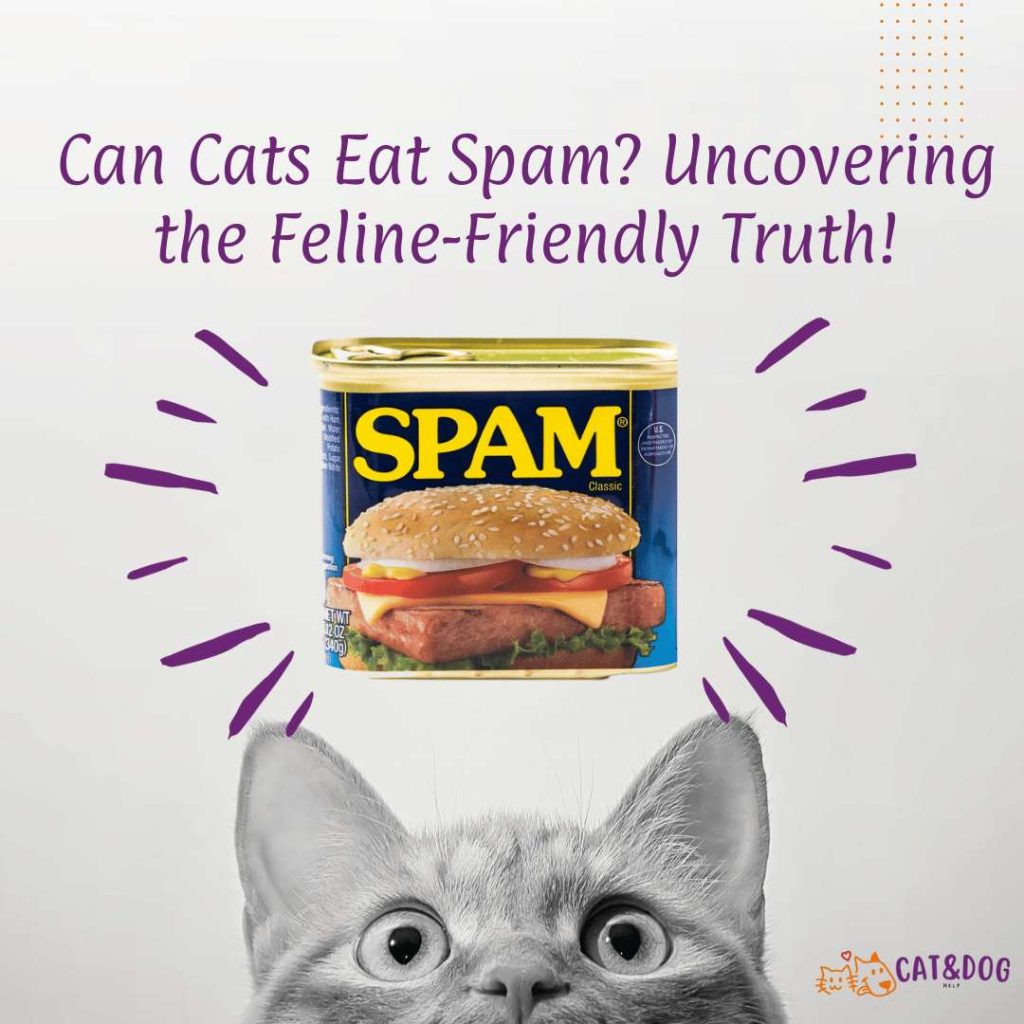Have you ever wondered if you can share your favorite canned meat with your feline friend? SPAM, a popular and convenient food item for many people, is not as beneficial for our cats.
Sometimes we give SPAM and bread together to our feline friends, and this is even more dangerous for their health.
This canned meat product, though not toxic to cats, contains high levels of fat and sodium, which can pose serious health risks to your feline companion.
Cats, being obligate carnivores, need a well-balanced and species-appropriate diet to maintain optimum health.
While SPAM’s apparent meat contents may seem harmless and even tempting to feed your pet, the processed nature of the meat, along with the additives and preservatives, can wreak havoc on a cat’s digestive and overall health.
It is important to note that feeding SPAM to your cat over a prolonged period of time can deter your cat’s health due to the high levels of fat and sodium it contains.
Key Takeaways
- SPAM is not a healthy or safe food choice for cats due to its high fat, sodium content, and processed ingredients.
- Regular consumption of SPAM can lead to health issues such as obesity, kidney damage, and heart problems in cats.
- Instead of SPAM, opt for appropriate and nutritious cat food or occasional treats that are low in fat and sodium for your feline friend.
Can Cats Eat Spam?
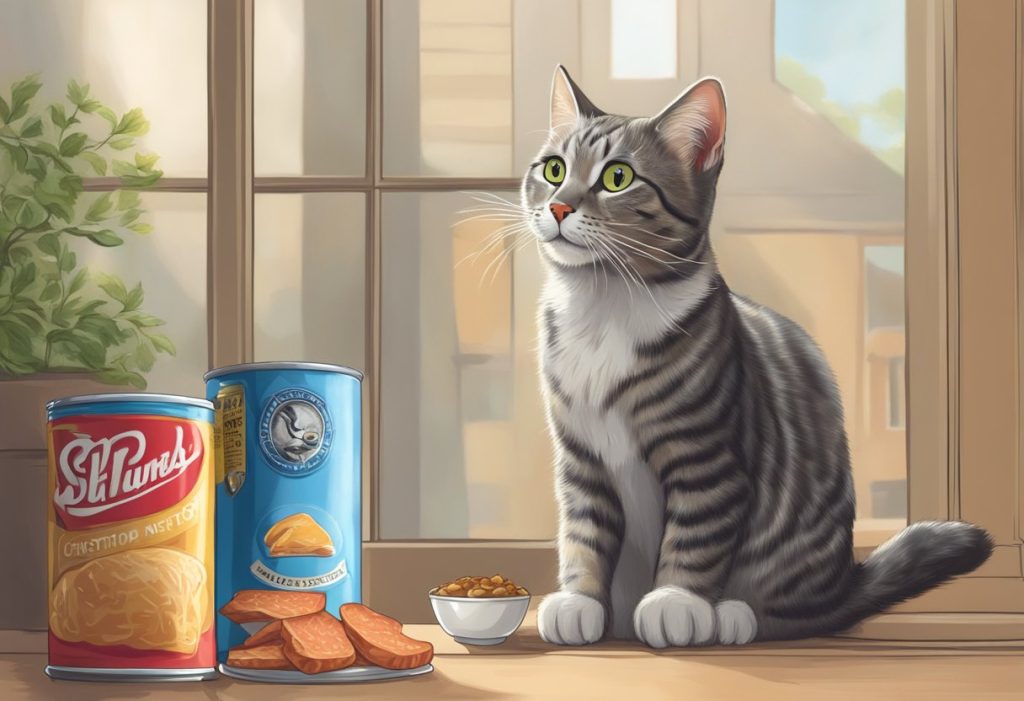
Have you ever wondered if you can share your favorite canned meat with your feline friend?
Before you do, let’s explore what Spam is and why it might not be the best idea for your cat’s diet.
Leads to Obesity
Obesity is a common and serious health issue for cats. It can shorten their lifespan and reduce their quality of life. (1)
With many cats in the US and other countries being overweight or obese, it’s essential to be aware of the possible consequences of feeding your cat Spam.
Spam is high in fat and calories, which can lead to feline obesity in cats. One ounce of Spam has 87 calories and 7 grams of fat, which is more than 10% of the daily calorie intake for an average cat.
Furthermore, Spam has a lot of saturated fat, which can raise cholesterol levels and increase the risk of heart disease in cats.
You can also avoid feeding other meat-based foods such as sausages, canned meat foods, etc.
Feline obesity is an incredibly common nutritional disorder for cats and can lead to a host of illnesses like diabetes, osteoarthritis, and pancreatitis. (2)
- Arthritis and joint pain
- Diabetes and insulin resistance
- Liver disease and hepatic lipidosis
- Urinary tract infections and bladder stones
- Respiratory problems and asthma
- Skin infections and allergies
- Cancer and tumors
Contains 20x More Sodium Than Cats Should Eat In 1 Day
While sodium is essential for cats as it helps regulate their fluid balance, nerve function, and muscle contraction, too much sodium can cause dehydration, thirst, vomiting, diarrhea, seizures, coma, and even death. (3)
Spam contains a high amount of sodium. One ounce of Spam has 353 milligrams of sodium, which is an enormous amount for cats, needing only about 16.7 milligrams per day.
This means that one ounce of Spam has 20 times more sodium than they need.
Additionally, the high amount of sodium in Spam can increase blood pressure and damage the kidneys and heart in cats. Excess sodium can lead to health issues such as:
- Kidney failure and chronic kidney disease
- Heart failure and cardiomyopathy
- Hypertension and stroke
- Brain swelling and edema
Now that you know the risks of feeding Spam, a pork meat product, to your cat let’s look at why it’s not appropriate for their digestive system and nutritional needs.
Spam is a processed meat made of pork shoulder, ham, salt, water, potato starch, sugar, sodium nitrite, and sodium ascorbate.
These ingredients, including pork meat product, are not suitable for obligate carnivores like cats, who require a specific diet focused on protein and low in carbohydrates.
In case your cat accidentally eats Spam, monitor their symptoms and behavior closely.
If they show signs of distress, such as lethargy or drooling, contact your veterinarian immediately. To prevent your cat from eating Spam, make sure to keep it out of their reach and never leave it unattended.
For healthier alternatives, consider offering your cat occasional treats low in fat, calories, sodium, and salt, such as cooked chicken, turkey, or fish without bones, skins, or seasonings.
Always introduce new foods to your cat gradually and in small amounts to avoid upsetting their stomach or causing allergies.
Lastly, be cautious of other human foods your cat should avoid, such as chocolate, onions, grapes, and dairy products, as these can be toxic or harmful to them. Keep these foods out of their reach, and consult your veterinarian if your cat consumes any dangerous foods.
What Is Spam?
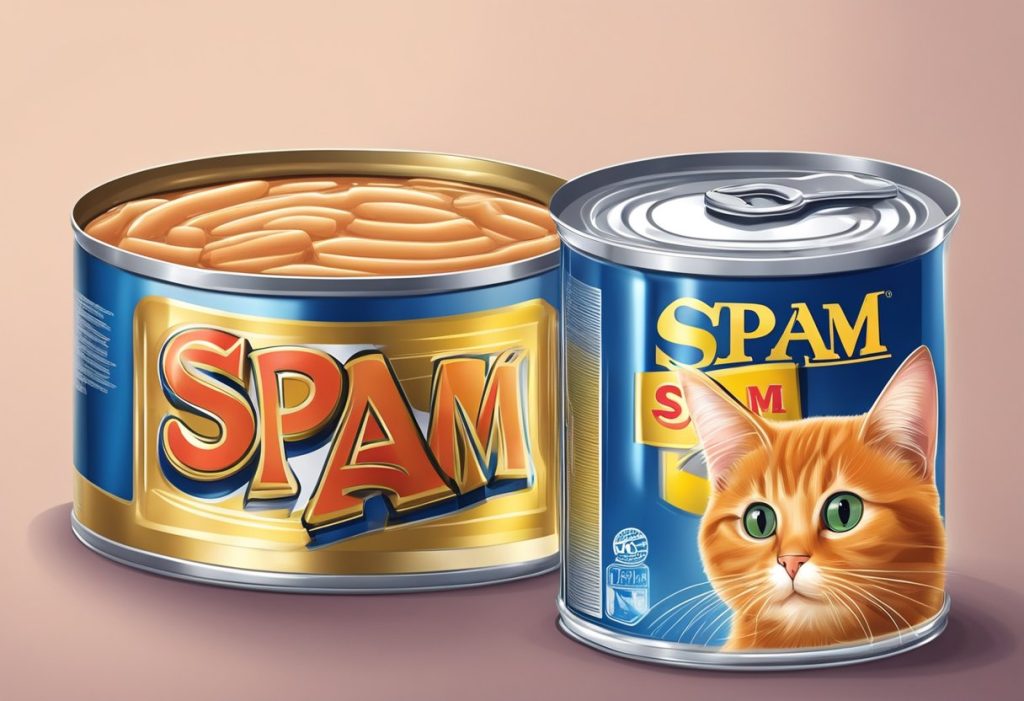
Spam is a canned meat product, specifically a cut of meat called pork shoulder, that was invented by Hormel Foods in 1937. (4)
It primarily consists of pork shoulder, ham, salt, water, potato starch, sugar, sodium nitrite, and sodium ascorbate.
The process of making Spam involves cooking it in its own can under high pressure and heat to kill bacteria and extend its shelf life.
The popularity of Spam can be attributed to its affordability, convenience, versatility, and long-lasting qualities.
Moreover, it has a distinctive flavor and texture that some people enjoy. The product holds cultural significance in several regions, such as Hawaii, Guam, South Korea, Japan, and the Philippines.
During World War II, Spam gained even more prominence as it was extensively used to feed soldiers due to its non-perishable nature and ease of transport.
Today, Spam still enjoys a loyal consumer base and is recognized as a staple in many households around the world.
What Happens If My Cat Eats SPAM? What To Do?
If your cat accidentally consumes SPAM, it could lead to several issues like vomiting, diarrhea, or more severe health problems.
A small amount of SPAM might only cause mild gastrointestinal symptoms, but a larger amount may cause dehydration, electrolyte imbalances, and even kidney or heart damage.
In case your cat consumes SPAM, monitor their behavior and any symptoms closely.
If you notice signs of distress, such as lethargy, weakness, panting, or drooling, you should contact a veterinarian immediately. If your cat doesn’t show signs of distress, ensure they have access to fresh water and provide a bland diet for a few days to help their stomach recover.
To prevent cats from consuming SPAM in the future, make sure it’s stored out of their reach and never left unattended.
Discourage your cat from being interested in SPAM by using a spray bottle or making a loud noise if they approach it.
SPAM is loaded with sodium and fat, which can cause severe health issues in cats.
In small amounts, SPAM might cause vomiting and diarrhea, but larger quantities can lead to more serious consequences like anemia, seizures, kidney failure, and damage to red blood cells.
To keep your cat healthy and safe, it’s important to be aware of the risks associated with feeding them SPAM and make necessary changes to your cat’s diet.
Stick to cat treats or alternatives catered to their nutritional needs. Being attentive to your cat’s diet and monitoring their health is key to ensuring a happy and healthy life for your feline friend.
SPAM Nutrients
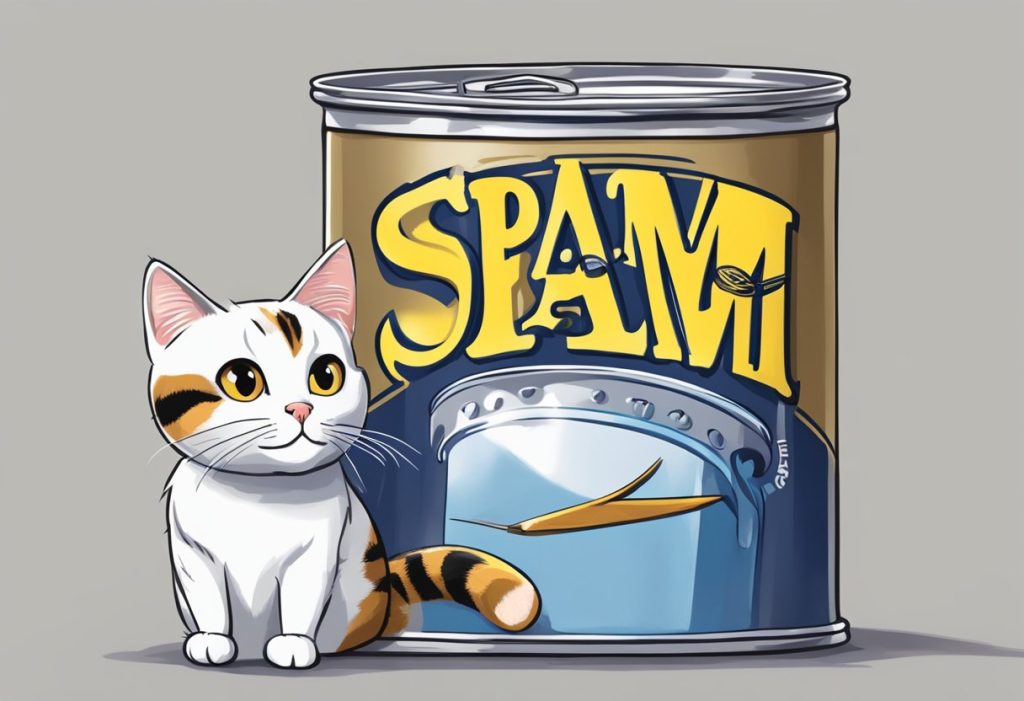
SPAM is a popular canned meat product consisting of processed ham and ground pork. It also contains other ingredients such as pork, ham, potato starch, salt, sugar, water, and sodium nitrate.
So, let’s dive into the nutritional aspects of SPAM and see how it affects your cats.
| SPAM Nutrition Facts (2 ounces) | |
|---|---|
| Fat: | 15 grams |
| Calories: | 174 |
| Sodium: | 34% of Daily Value |
| Protein: | 7 grams |
| Carbs: | 2 grams |
One of the most concerning aspects of SPAM is its high sodium content. Just 2 ounces of SPAM contains 15 grams of fat and 174 calories. The sodium content is also alarming, with 34% of a person’s daily value wrapped up in a single serving. Cats only need around 16.7 milligrams of sodium per day, which means SPAM’s sodium content is simply too high for your feline friend.
However, despite it containing some protein, iron, zinc, and vitamin B12, the nutrients in SPAM aren’t necessarily beneficial for cats.
The protein quality is not complete, meaning it lacks all the amino acids that cats need.
Additionally, the iron and zinc in SPAM are not well-absorbed by cats due to the presence of phytates and other inhibitors.
Moreover, SPAM is high in fat, calories, and sugar, which can lead to obesity and other health issues in your cat.
The high sodium content and salt make it unsuitable for a cat’s diet since it can contribute to kidney problems and heart issues.
In conclusion, while SPAM isn’t toxic to cats, the high sodium, salt, and fat content of this processed food make it an unhealthy and unsuitable food choice. Instead, provide your cat with a well-balanced and complete diet that meets their nutritional needs and preferences, and stick to occasional treats that are low in sodium and fat.
Spam Alternatives for Your Cat
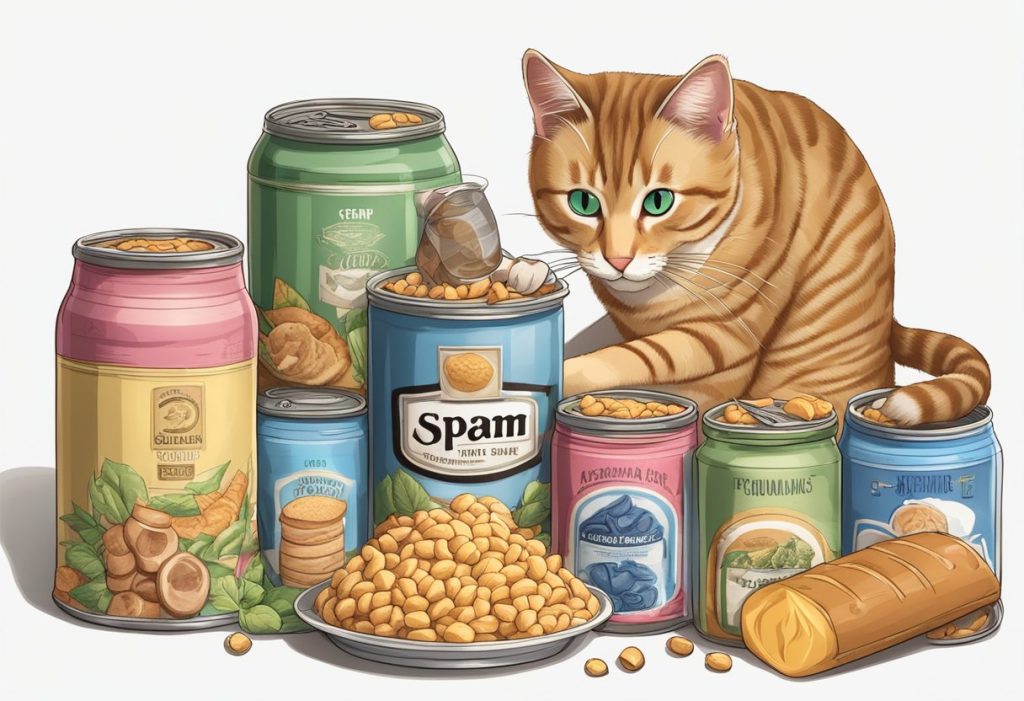
If you’re looking to satisfy your cat’s craving for meat while avoiding unhealthy options like Spam, incorporating the best thing you can do for him is to feed him a high-quality diet.
Stick to a diet full of high-quality animal proteins and always feed him appropriate food for his life stage.
There are plenty of alternatives that can provide your feline friend with a safe and healthy source of animal protein, which can be easily incorporated into your cat’s diet as occasional treats or meal additions.
One of the safest and healthiest alternatives to Spam is commercial cat dry food designed specifically for felines. These foods provide a balanced diet with complete animal proteins and essential nutrients needed to maintain their overall health.
Aside from commercial cat food, you can also offer your cat healthy, whole-food treats such as cooked chicken, turkey, or fish. Be sure to remove bones, skin, and avoid seasonings that may be harmful to cats, such as garlic or onion powder.
In addition to animal proteins, introducing small amounts of fruits or vegetables can give your cat some added nutrients and variety in their diet. Choose cat-safe options like apples, bananas, carrots, or cucumbers.
When introducing any new food to your cat, it’s essential to do so gradually and in small amounts.
This will help avoid upsetting their stomach or causing allergies. Consider mixing these new additions with their regular food, gradually increasing the proportion over time. Always remember that treats should not make up more than 10% of your cat’s daily calorie intake.
Keep your cat’s diet well-balanced and nutritious, while avoiding unhealthy options like Spam, to ensure their long-term health and well-being.
What Other People’s Foods Should I Avoid Giving My Cat?

While it’s important to keep Spam away from your cat due to its high fat and sodium content, there are also other human foods that you should avoid giving to your feline friend.
These foods can be harmful or even toxic to cats, posing serious health risks.
Chocolate, some types of cheese and caffeine, for example, should be avoided as they can cause symptoms like vomiting, diarrhea, tremors, and seizures in cats. For more info read my recent article on can cats eat cheese?
Likewise, onions and garlic are harmful as they can cause anemia and damage red blood cells. Grapes and raisins are also dangerous, having the potential to cause kidney failure.
Furthermore, alcohol, xylitol, and certain dairy products should not be given to cats. Alcohol and xylitol can lead to liver failure and hypoglycemia, while dairy products can cause lactose intolerance and diarrhea.
Raw meat, eggs, or fish can result in bacterial infections and parasites, and bones can cause choking, splintering, or digestive tract perforation.
To keep your cat safe, make sure to keep these foods out of their reach and avoid feeding them any human foods containing these harmful ingredients.
If your cat ingests any of these substances, immediately contact a veterinarian and follow their advice.
While indulging your cat with human foods might seem like a treat, it is crucial to prioritize their health. Instead of sharing potentially harmful food with your furry friend, consider the tips for healthy food alternatives laid out in this article and keep your cat safe and happy.
Frequently Asked Questions
Can cats eat canned meats like luncheon meat?
Cats should not be fed canned meats like luncheon meat or Spam because of their high sodium content and other unhealthy ingredients. Feeding your cat such processed meats can lead to health issues like obesity, dehydration, and heart problems.
What human foods are safe for cats to eat?
Cats can eat some human foods as occasional treats. Safe options include cooked chicken, turkey, or fish (without bones, skin, or seasonings), boiled eggs (without shells or salt), and plain, low-fat cottage cheese or yogurt. Certain fruits and vegetables like apples, bananas, carrots, and cucumbers are also safe for cats. For a more comprehensive list of feline-friendly meals, visit What Human Food Can Cats Eat: The Essential List For Owners! Cats can also enjoy eggs, but it is important to ensure they are cooked to avoid the risk of salmonella or E. coli. Raw eggs, on the other hand, contain avidin, a protein that cats cannot digest and can lead to metabolic issues according to Pastoor, F.J.H., a faculty member at the Utrecht University in the Netherlands.
Are there any similarities between dog and cat diets?
While both cats and dogs are carnivores, their nutritional needs differ significantly. Cats require a higher protein intake than dogs and have unique nutrient requirements like taurine and arachidonic acid. Therefore, it is essential for pet owners to provide specific diets tailored for their species and avoid feeding your cat dog food or vice versa.
Is tuna safe and healthy for cats?
Tuna, when given in moderation as an occasional treat, can be safe and healthy for cats. However, feeding your cat too much tuna can lead to nutritional imbalances and mercury exposure. Make sure to offer tuna as an occasional treat only, and remember that a complete and balanced cat food should be the primary source of nutrition.
What are common toxic foods for cats?
Some common toxic foods for cats include chocolate and caffeine, onions and garlic, grapes and raisins, alcohol and xylitol, dairy products, and raw meat, eggs, or fish. To keep your cat safe from these foods, do not feed them any of these substances and keep them out of their reach.
Which meats are best for cats?
Cats are obligate carnivores and thrive on a diet consisting primarily of animal proteins. The best meats for cats include chicken, turkey, and fish. It’s important to ensure that the meat is cooked without bones, skin, or seasonings and portioned appropriately. Avoid processed meats like Spam or luncheon meat, which can be harmful to their health.
- No Account Gambling Enterprise: The Future of Online Gambling - August 2, 2025
- Introduction to Free Slots Machines: The Ultimate Guide - August 2, 2025
- Как вывести деньги с Lucky Jet: подробное руководство - August 1, 2025

